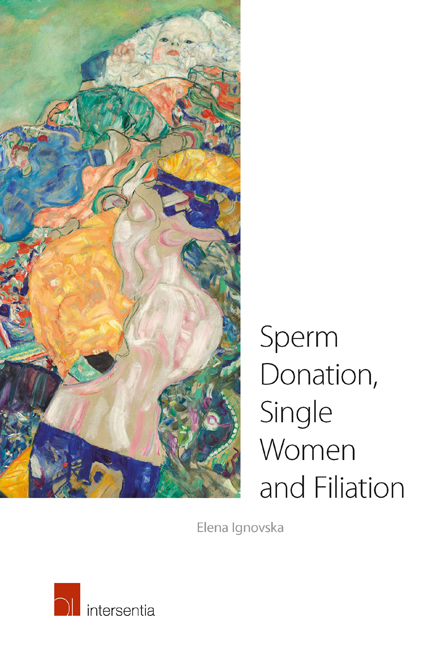Book contents
- Frontmatter
- Dedication
- Foreword
- Contents
- List of Abbreviations
- Introduction
- PART I MAPPING THE TERRAIN FROM AN INTERDISCIPLINARY AND INTERNATIONAL PERSPECTIVE
- PART II THE LEGAL, ETHICAL AND SOCIOLOGICAL POSITIONS OF THE PARTICIPANTS
- Chapter 4 Assisting Single Women to Found Families
- Chapter 5 Sperm Donors as Assistance to Reproduction for Single Women
- Chapter 6 Children Conceived by Sperm Donors’ Assistance to Single Women
- PART III LEGAL WAYS OF ESTABLISHING FATHERHOOD
- References
Chapter 5 - Sperm Donors as Assistance to Reproduction for Single Women
from PART II - THE LEGAL, ETHICAL AND SOCIOLOGICAL POSITIONS OF THE PARTICIPANTS
Published online by Cambridge University Press: 12 December 2017
- Frontmatter
- Dedication
- Foreword
- Contents
- List of Abbreviations
- Introduction
- PART I MAPPING THE TERRAIN FROM AN INTERDISCIPLINARY AND INTERNATIONAL PERSPECTIVE
- PART II THE LEGAL, ETHICAL AND SOCIOLOGICAL POSITIONS OF THE PARTICIPANTS
- Chapter 4 Assisting Single Women to Found Families
- Chapter 5 Sperm Donors as Assistance to Reproduction for Single Women
- Chapter 6 Children Conceived by Sperm Donors’ Assistance to Single Women
- PART III LEGAL WAYS OF ESTABLISHING FATHERHOOD
- References
Summary
The political as opposed to natural constitution of ancient families for some authors is associated with the fiction of patriarchy. This had a meaning of a form of political power that when introduced only referred to the sexual domination of the rule of husbands and fathers in the smallest cell of society. Only afterwards did the fiction of patriarchy take on the broader meaning of class domination, and thus a universal feature of human society. Accordingly, the representatives of this stream associate the father's role in the family as strictly conventional (i.e. imposed by force) and thus the family only as an artificial institution that negotiates the roles of its members, just as society does. In these terms, the patriarchal family is not based on biology or natural ties, but on “legal fiction”. While the mother's biological participation is always certain as the one who physically gives birth to the child, paternity has to be discovered or invented, therefore becoming only human creation. This fiction though, served the political role of keeping the family together. Thus, the “fiction of adoption” and the “reality of kinship” were considered equal as long as the family formation was maintained. By analogy, ancient families are not much different from the contemporary families founded by adoptions or by sperm donations. Again, the role of the father is negotiated – the “legal fiction” of the husband as being present when sperm is donated to couples, and his non-existence when sperm is donated to single women. Despite genetics, lacking social and legal fathers in children's lives could be an experience of single-mother families founded naturally too. Nevertheless, lacking both a genetic and social father is exclusively ascribed to single women – parents by choice. Is fatherhood so unimportant?
In the comparative literature, there has been much less interest in investigating men as fathers and their experiences in reproductive rights and policies in comparison to women as mothers. Reproduction, family life and child rearing have traditionally been considered to belong to the women's domain. Consequently, males’ reproductive choices, sexuality, child rearing and family identifications have been neglected. As such, the lack of literature that deals with the reproductive experiences of men as begetters, donors or social parents makes the topic a rather ambiguous field for making assumptions or conclusions.
- Type
- Chapter
- Information
- Sperm Donation, Single Women and Filiation , pp. 183 - 224Publisher: IntersentiaPrint publication year: 2015

